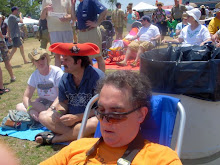Ninth Circuit Recognizes Juror Independence
It's about time.
Ed Rosenthal was convicted of growing marijuana in a San Francisco federal courthouse in January of 2003. Ed was a large grower of marijuana for the medical marijuana dispensaries in California. The trial court judge, Charles Breyer, refused to allow the defense to make any mention of the fact that Ed was growing marijuana for medical use. This, in spite of the fact that Ed was licensed under State law, and deputized by the city of Oakland, to do exactly what he was doing.
While most legal commentators agree that Breyer made the right decision by foreclosing any mention of medical marijuana, I have argued elsewhere that Ed should have been allowed to present evidence that undercut the moral underpinnings of the law. If, as Old Chief v. United States holds, evidence which shows a conviction is morally reasonable is relevant, then evidence that a conviction is morally unreasonable is relevant. While numerous federal judges do hold this view, Breyer was not among them. Rosenthal's constitutional right to present his defense was stopped in its tracks.
What happened following the conviction was virtually unprecedented. At least half the jurors (and both alternates) held a press conference on the steps of the federal courthouse the week following their verdict, proclaiming that if they had known that Ed's was a medical marijuana case, they would not have convicted him.
The jurors appeared on televised news shows. The juror's rebellion was fodder for TV and radio talk shows, news reports, print articles, and, of course, the internet. Why were they so angry? If the jurors had been informed that this was a medical marijuana case, they would not have convicted. The foreman of the jury, Charles Sackett, said that "I think jury nullification is going to be part of the answer regarding states' rights in future cases."
"What happened was a travesty and it's unbelievable, unbelievable that this man was convicted. I am just devastated," said juror Marney Craig.
Marney Craig had considered nullification, but she checked with a lawyer friend who told her that she could get in trouble if she refused to convict on conscientious grounds. She discussed this with two other jurors, Pam Karkowski and Eve Tulley-Dobkin. They voted to convict due to fear of repercussions had they done otherwise. Based on these facts, Rosenthal's lawyers filed a Motion for New Trial based on juror misconduct. It was denied, because the only thing the jurors had been told was not to nullify. In Judge Breyer's words:
Rosenthal's argument would be that a new trial is warranted because Craig's friend's exhortations to follow the law interfered with Craig's inclination to disobey it. This novel proposition is fundamentally irreconcilable with the Court's responsibility “to forestall or prevent” nullification whenever it is possible to do so. Rosenthal has failed to identify a single published decision in support of this argument, and this Court will not be the first to write one.
The Sentence: Breyer Appeases his Critics
Ed was sentenced on June 4, 2003. While the federal government asked for a sentence of at least six years, Breyer, citing the "extraordinary, unique circumstances of this case," sentenced Ed to only one day in jail - a day he had already served. Was Breyer doing what he thought right - or was he trying to appease the jurors, and the public, that had rallied so strongly against his denying Rosenthal the right to present evidence of medical marijuana in court?
Both sides appealed - Ed appealing his conviction, and the Government appealing the one day sentence. The Ninth Circuit Court of appeals heard argument in the case in September, 2005 - and issued its decision yesterday, April 26, 2006.
Ninth Circuit: Can't Coerce Jurors to Follow Law
The Court, in a unanimous opinion written by Judge Betty Fletcher, held that Rosenthal was entitled to a new trial. The Court of Appeals disagreed with Judge Breyer over whether Juror Craig's conversation with a lawyer (who told her to follow the law) constituted prejudicial extraneous information. The Court held that the circumstances and nature of that conversation left it dubious whether the jurors were left to deliberate without undue outside pressure or influence. The (erroneous) information was that the jurors could get "in trouble" for failing to apply the law. The Court held:
Jurors cannot fairly determine the outcome of a case if they believe they will face “trouble” for a conclusion they reach as jurors. The threat of punishment works a coercive influence on the jury’s independence, and a juror who genuinely fears retribution might change his or her determination of the issue for fear of being punished.
The verdict was overturned because the jurors received outside pressure that coerced them into not committing jury nullification. So much for any claims that jury nullification is illegal.
BTW, the Court ended its opinion noting that it was not inclined to disturb the "reasoned analysis" which led to Rosenthal's one-day sentence. The sole remaining questions: will Rosenthal be retried? And if so, will another San Francisco jury ever convict him?

